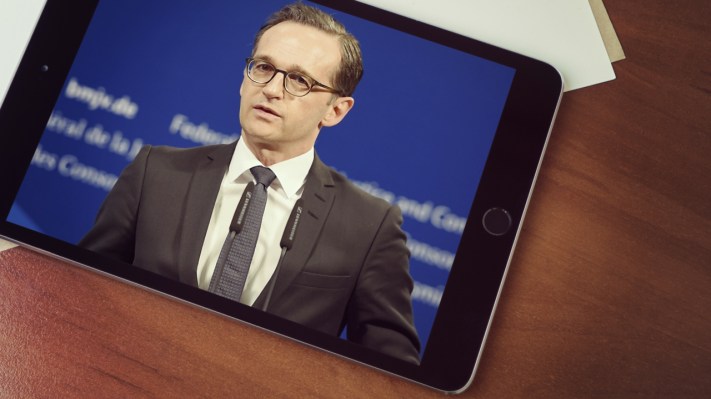The German cabinet has backed proposals to hit social media firms with fines of up to €50 million if they fail to promptly remove illegal hate speech from their platforms — within 24 hours after a complaint has been made for “obviously criminal content”, and within seven days for other illegal content.
The draft law would also see individuals from companies facing fines of up to €5M for any criminal content removal failures.
In a statement today [translated via Google Translate], German Justice Minister Heiko Maas said: “The providers of social networks are responsible when their platforms are abused to spread hate criminality and criminal false news. There can be just as little space on social networks for criminal acts as on the street. To do better, we owe the victims of hate criminality. The Internet is characterized by the debate culture and the social climate in our country. Verbal radicalization is often the precursor to physical violence.”
“Freedom of expression ends where criminal law begins,” he added.
Germany has specific hate speech laws which criminalize certain types of speech, such as incitement to racial violence. But Maas is also agitating for a European-level approach to tackling the spread of hate speech by online platforms, saying now that he will present the government’s proposals for regulation to colleagues in the European Council of Justice and Home Affairs Ministers.
“We want to continue the process at European level,” he said.
The EU currently has 28 Member States, including Germany, and in May last year its executive body, the European Commission, unveiled a code of conduct for handling hate speech on social platforms, securing agreement on this initiative from Facebook, Twitter, Google and Microsoft. It remains to be seen whether the EC will feel the need to push for a tougher stance across the region.
The German government has been cranking up the pressure on social media companies to tackle a surge in hate speech sentiments spreading via their platforms for several years now, following the refugee crisis in Europe.
In December 2015 it secured an agreement from Facebook, Google and Twitter they would delete hate speech on their platforms within 24 hours. But it’s been unhappy with their performance — calling out Facebook and Twitter for poor complaint handling earlier this month, when it also proposed the new law that’s now been approved by the cabinet.
The government is clearly hoping the threat of fines will enforce better handling of complaints and faster removal of illegal content than political pressure and verbal agreements from social media giants to ‘do more’ has thus far achieved.
A recent analysis of the performance of the three firms at handling hate speech complaints in Germany, conducted by local youth protection organization jugendschutz.net, found that Facebook only deleted 39 per cent of reported criminal content, while Twitter only removed one in a hundred reported messages. (Although Facebook disputed those results — saying its own analysis showed it was performing better.)
Google was judged to have faired better at swiftly nixing hate speech from its social sharing platform YouTube. (Although the company has recently faced a separate backlash from advertisers concerned that their marketing messages are ending up alongside extremist content.)
Maas said today the cabinet backing for the draft law paves the way for it to be adopted in Germany within the current legislative period.
We’ve reached out to Facebook, Twitter and Google for comment and will update this story with any response. Update: A Facebook spokesperson has now provided the following statement: “We work very hard to remove illegal content from our platform and are determined to work with others to solve this problem. As experts have pointed out, this legislation would force private companies rather than the courts to become the judges of what is illegal in Germany.”
Facebook previously told us it will have more than 700 people working on content review for it in Berlin by the end of the year, adding: “We are committed to working with the government and our partners to address this societal issue.”
On the fake news front, the company has been trialling new tools to flag disputed content in Germany since January, as well as working with a local third party fact checking organization.
Twitter has also made recent changes aimed at reducing the spread of abusive content on its platform — which a spokesman previously told us may not have been in place at the time jugendschutz.net was monitoring its performance.
